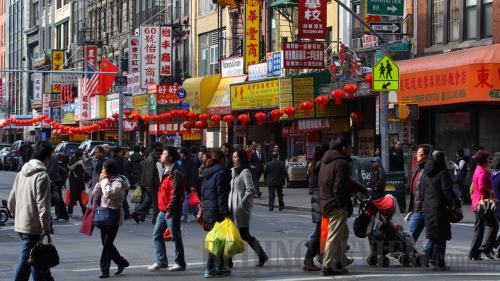|
 |
|
CHINESE CHIC: Visitors pack New York City's Chinatown, decorated for the traditional Chinese Lantern Festival, on February 17 (XINHUA) |
Few Americans know the United States, their homeland and the supposed land of the free, once targeted Chinese immigrants in a series of racial exclusion acts.
In 1882, the U.S. Congress passed the Chinese Exclusion Act, which restricted Chinese immigration to the United States for 10 years, the first time the U.S. Government denied entry to any race or ethnicity. Bills in 1892 and 1902 extended the ban. The law was eventually overturned in 1943 as a result of U.S. wartime alliance with China during World War II.
On May 26 this year, House Democrat Judy Chu from California and House Republican Judy Biggert from Illinois introduced a bipartisan resolution calling on the U.S. Congress to formally acknowledge and express its regret over the laws that so clearly violated the fundamental civil rights of Chinese settlers.
"It is long overdue that Congress officially acknowledges these ugly laws, and expresses the sincere regret that Chinese Americans deserve," Chu, the first Chinese American Congresswoman, said. "The last generation of settlers impacted by this legislation are leaving us, giving Congress a short window to make amends to those who were directly affected."
Biggert said her constituents in suburban Chicago urged her to take up the issue.
"I think this is an important thing that we are a country where everyone is equal and gets equal rights," she said. "We have to keep that in front for future generations, because otherwise it will happen to someone else in a similar way."
In the Senate, a parallel bipartisan resolution was introduced by Senator Dianne Feinstein, a Democrat from California, and Senator Scott Brown, a Republican from Massachusetts.
Drawing attention
Together with his colleagues, Martin B. Gold, a partner at the Washington, D.C. office of the Covington & Burling LLP law firm, has been spending time and resources on the campaign to seek an apology for Chinese exclusion laws by providing free legal counsel to advocates.
Gold's interest in the topic was piqued in 2009 when he heard people talking about a landmark bill approved by California's legislature to apologize to the state's Chinese American community for exclusionary laws passed more than 100 years ago.
"It is very important to bring [these laws] to light to increase people's awareness, so that they'll understand that this kind of things did happen in American history and there is the opportunity to acknowledge the history and express regret," Gold said.
The original list of congressional supporters of the resolutions included four members of the House and seven members of the Senate, he said. The support base has since expanded significantly as activists beef up their lobbying efforts.
Chinese American communities are actively involved in raising people's awareness and calling on their members to try to persuade local lawmakers to support the bipartisan resolutions.
Michael Lin, Chair of the 1882 Project Steering Committee, a nonpartisan grassroots effort focused on educating lawmakers and the public about Chinese exclusion laws, said his organization will "work tirelessly to help Congress pass these resolutions."
Joining these efforts is the 80-20 Initiative, a national nonpartisan political organization dedicated to winning equal opportunities and justice for all Asian Americans through a swing bloc vote, for which 80 percent of Asian American voters will unite behind the presidential candidate who best represents their interests.
| 